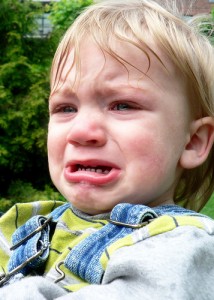3 Year Olds are Quite PROBLEMATIC

According to Sarah Feder in the Huffington Post dated 2/27/14, she indicated that her 3 year old daughter is a hemorrhoid to put it mildly. In fact, she said that 3 year olds are a****oles.
Ms. Feder, the mother of 2 children, proclaimed that her daughter was contentious and difficult. She stated that 3 year olds are the most difficult people to negotiate with. She stated that each time she wanted her daughter to do something, it would be a battle.
Ms. Feder further maintained that her 3 year old daughter is very strong willed, wanting her way. She thought that the terrible 2s were problematic enough. She further stated that 3 year olds are EVEN WORSE than 2 year olds!
Here's the link,
http://www.huffingtonpost.com/sarah-fad … assholes-b
The link does not take one straight to the article; it says A 404 ; however, there is a search bar, just type, " Sarah Fader says 3 year olds" and it takes you right to the article.Missing the point, Ms. Fader stated that 3 year olds can be a***oles. That is a highly inappropriate way to describe a toddler. Don't YOU think? I do! Yes children can be problematic and a lot of responsibility.
However, people should consider this in full before becoming parents. Parenthood is not all honey and cake, it can be quite vinegarish at times. If one does not want the vinegarish part, do not become a parent.That's horrible. Some people shouldn't have children. I feel sorry for her kids.
If her daughter is an a**hole it is for a reason, and that reason is the parenting the child is getting. Which pretty makes the parent the a**hole, right along with the child that has been taught to be one.
That's odd, my children didn't turn into a**holes until they became teenagers.
After reading her blog, I see it more as someone who thinks she's funny and wants an audience. No wonder her children give her issues. I work with 3/4 year olds and I would never tag them as she has. While there are those that are more challenging than others, three's are at an incredibly important age for brain development and for many, it's the beginning of social interaction outside their immediate family.
Possibly the biggest lesson I've learned from three's is how to listen to the child. Behavior speaks volumes, but the child inside is not the behavior. Learning how to communicate and parent/instruct a three year old requires patience and a willingness to understand how a child learns. Testing boundaries is just one of the normal characteristics of any typical three year old. Defining boundaries doesn't have to be burdensome. A three year old will be more than eager to help decide appropriate consequences if given the opportunity to help 'make the rules'. A three year old has an expanding ability to discuss and comprehend when conversed with rather than simply 'spoken to'.Total agree with your eloquent and insightful response.
The problems are not easily avoided, but can be corrected with the proper understanding.
1. The child was so wonderful and amazing, learning, progressing and revealing such amazing potential to be an adorable, loving person… but then around age two, the *sense of independence* starts to rear its (wonderful) head. "I want to do it my self!"/ "I want to carry the biggest box!"/ "I want my own purse!" / "I want a credit card and a cell phone and an iPad and an iPod!" I want to stay up, have some juicy steak and a beer with you guys!"
They are starting to change... through no fault of their own… according to the dictates of nature.
*We must understand that NATURE is forming the child*
2. The child was spoiled during the first two years, (through no fault of your own… he was just so cute!) If you have allowed your child to tell you what to do for the first two years, don't think that will change overnight . But, it must be changed! BY YOU!
You must now set boundaries with consistency and effort.
Question: HOW?
Answer:
1. You must establish the fact that YOU are in charge.
2. YOU must set the rules of proper/safe behavior.
3. The Rules of Proper/Safe behavior must be set with Consistency and Good Example.
4. Stand behind your "NO!"Your two statements above contradict each other. Nature alone does not form the child, nor does not establishing boundaries mean that a parent creates a jerk.
Nature prompts the child to absorb the environment and the habits, customs and manners of the people in the environment. When the parent does not set the proper boundaries, the child will not act appropriately.
To explain it further:
The first six years of life is when the psyche develops. Nature within the child is building itself according to an inner "sense of order," (meaning the reality of how things are,) and also according to nature driven stages and phases of development. Once set, what has been absorbed into the psyche is permanent and very hard to change. That's why it is so important to establish the boundaries during the first six years of life.
Would you agree with this explanation? My advice and observations are based on learning and applying the principles of Dr. Montessori in and out of class room (Montessori-based environments) settings. I studied the books she wrote while mentoring with a woman who worked directly with Dr. Montessori and later became the directress of her own school. Montessori is not well regarded in universities. However, it is possible, she was ahead of her time.While I highly regard the observations and teaching methods of Montessori, I don't think it's reasonable or logical to believe that nature alone forms the child. I've worked with hundreds of 3-5 year olds in my 17 year career as an early childhood educator, plus parented my own two sons. Perhaps it would help if you define your use of the word nature. Nurturing a child is critical for healthy child development, but if lacking, it doesn't mean a child cannot development into a caring human being. Plenty of parents set boundaries, and not only set them, but enforce them like a military commander. Not only is that not natural, it's not nurture either. Does that necessarily mean the child won't act appropriately? Not at all. Unless you consider appropriate behavior what a parent demands. I don't. A parent isn't always right. Parents often create their own problematic behaviors in children by demanding rather than nurturing.
When I observe and work with challenging behaviors, the first thing I want to know is what the child eats and drinks. How much sleep does the child receive. How do parents/caregivers communicate with the child. Nature can't very well compensate for a child who is fed junk, doesn't get enough sleep and is thrown out commands of do this and don't do that. At some point, nurturing is required, if not by a parent, hopefully by some other source.Nature is what creates the human body. that is all. I agree with what you say.
Does that include the brain? And the neuronic pathways that define memory or personality? Emotional responses and reasoning ability?
Does nature create the mind as well? Part of it?One may think of it as the soul interacting, through the senses, with the environment. The soul is actually considered, by Montessori, to be incarnating into the body. It is a very miraculous and mysterious process that defies explanation, if you observe it in action, (observing the child as it grows.)
OK, but the basic question remains. Does the environment affect and help "design" or "build" or "create" the mind (soul)?
If a baby pokes bites through an electric cord and is forever very afraid of cords, has nature had an effect on the mind?
If a baby grows up with love all around it and is very loving later in life, did the environment (people around it) have an effect and help make it the loving person it became?Q. Does the environment affect and help "design" or "build" or "create" the mind (soul)?
A. Yes.
The environment has a total effect on the child as he adapts to it... as he absorbs his environment and records his experiences…through his mind (soul) and body.
You are aware that Montessori was speaking figuratively... and that you are completely butchering her educational philosophies.... right?
Nevermind... I'm not arguing with you.
Here's the link...(for people who actually want to learn the non-mumbo-jumbo version) Wiki actually did a pretty good job with the basics.
http://en.wikipedia.org/wiki/Montessori_educationMontessori said:
“The things he sees are not just remembered; they form a part of his soul.”
See quotes link below.
In psychological terms, nature refers to genetic inheritance, heredity. Environmental influences are the nurturing aspects of child development. Both play a part in forming the psyche. Montesorri is but one philosophy or theory of early childhood development. Much has been discovered about the brain and how humans develop. A region of our brain continues to grow new cells throughout our lifetime which affects learning and memory. While personality can emerge at the age of 5, a person can evolve and adapt throughout a lifetime by learning and experiencing. That's one reason why someone born into a difficult environment can rise above the challenges and become a well adjusted, healthy human being. Difficult childhood memories can energize a person to want to live differently. The difficult three year old is not destined to be a difficult adult. As noted above, the environment a child lives in can create the problematic behaviors the OP discusses. The child is simply responding, but the behavior does not make the child who she is.
According to Dr. Montessori, the development of the body occurs during gestation in the womb. After the baby is born, the body only grows bigger and stronger. The psyche is formed after birth throughout the first six years. Montessori actually called of the period of the spiritual embryo, (development of the psyche.)
Montessori said the child is perfect at birth. This leads me to believe that she considered the child to be a perfect soul incarnating into the body. While she operated as a scientist in observing children, she was a very devout person who believed in God. (In fact, she noted children that are very receptive to the reality of God.)
The child reveals his own individual character as he grows. His stimulus for life comes from within and is spurred on by his natural *joy of life* which she called "horme."
The spiritual embryo unfolds according to stages of progressive development.
It is important to understand these stages to be able to assist the child in his growth. Read The Absorbent Mind and The Secret of Childhood by Maria Montessori. She explains these principles in depth according to her research.Dr. Montessori doesn't sound very smart to me. I'm no child psychologist - far from it - but cannot imagine anyone saying that puberty (a dozen years after birth) doesn't change the psyche (soul) a great deal. And as the "logic" capabilities come into being, it can and does change again. I can't even seeing anyone thinking a child is "perfect" at birth; they are a squalling mass of flesh, without morals or real intellect and unable to care for themselves; hardly "perfect".
Dr. Montessori would appear to be putting her spiritual ideas onto infants without regard to reality. No doubt the good doctor has some very good thoughts and conclusions, but when she finds it necessary to spout such nonsense to fit into her personal god ideas she crosses the line from science into imagination.No because every person is a soul from the soul of God.
Science and spirituality are one.
Take it or leave it, wilderness.
Have it your way.
The truth holds its own whether you believe it or not.If you say so. Personally I find their methods of discovering "truth" to be quite different, inevitably resulting in a vastly differing "truth".
But being a soul from inside a god means that the psyche does not change with puberty? It is exactly that kind of muddy thinking that makes the rationalizations of the believer useless in real life.The first six years lay the foundation for the individuality. The fifteen year old can then operate with free will. If he has had good guidance he will tend to guide his free will accordingly. If he has not had good guidance or has had no guidance at all, he will have a harder time in life. What is so hard to accept about that?
Healing , growth and change are always a potential according to the will of the individual …..soul!! Believe me she was scientific in her observations and discoveries without false doctrines as you are mentioning.
...not a jerk, but a very unruly child, wouldn't you say? I removed all mention of that word. Thanks.
“It is in the encounter of the maternal guiding instincts with the sensitive periods of the newly born that conscious love develops between parent and child.”
“Of all things love is the most potent.”
Maria Montessori
http://www.dailymontessori.com/maria-montessori-quotes/Other quotes by Dr. Montessori regarding the nature of the child:
“The things he sees are not just remembered; they form a part of his soul.”
“The first essential for the child’s development is concentration. The child who concentrates is immensely happy.”
“Plainly, the environment must be a living one, directed by a higher intelligence, arranged by an adult who is prepared for his mission.”
“The child builds his inmost self out of the deeply held impressions he receives.”Q. 'If a baby pokes bites through an electric cord and is forever very afraid of cords, has nature had an effect on the mind?'
A. It would stand to reason that the baby's reaction to the environment had an effect on the baby's mind.
Mother should have prevented that from happening.
Note: The mother, father or adult in charge is part of the environment. The child is programmed by nature to follow the parents for this very reason. The child at this stage of psychic development is not a blindly willful creature. He follows the parents for the sake of survival, and furthermore, wants to please them out of love.
Q."If a baby grows up with love all around it and is very loving later in life, did the environment (people around it) have an effect and help make it the loving person it became?"
Q or nature, in that the child, from birth, is a loving entity?
A. I would have to say,* both* (nature and environment.)"But being a soul from inside a god means that the psyche does not change with puberty?"
Of, course the child changes according to his own will and his own soul. The foundation has been layed already, (by himself, on a subconscious level, through and according to the the laws of nature,) and now he goes forth to continue his further development, consciously.
Think back to your own life! Around age fifteen we get a conscious sense of our own autonomy. But before that we were quite willingly obedient. (Unless deviated by bad parenting where the child must rebel to save his own soul.)
Right?"The psyche is formed after birth throughout the first six years"
"Montessori said the child is perfect at birth."
"Montessori actually called of the period of the spiritual embryo, (development of the psyche.)"
"This leads me to believe that she considered the child to be a perfect soul incarnating into the body."
Thank you. We agree, and thus none of these statements indicating that the psyche (mind, or soul) are complete at birth are true. Which is really all I meant.The psyche is actually forming itself. This is the mysterious part. She advocated respecting the process which is unfolding according to the laws of nature. We do not open up the womb to tell the body how to form. It is the same thing with the spiritual embryo. Nature is forming itself and we must respect that process and help it, yes… but knowing how is the tricky part. We can addict the child to ourselves with too much intervention/ outer stimulation as with too much technological screen time. We must know when to step in and when to step out.
It being as we cannot find or interact with a spiritual embryo, it is indeed hard to know what to do. Perhaps the best bet is to simply acknowledge that IF it is there at all it is something best left alone; behave as if it isn't there at all, in other words.
The child's mind, on the other hand, we can very definitely interact with and it is our duty and task to mold it into something useful to both itself and society. To teach it what it needs to know to survive and enjoy this world. To train it to think and reason while still allowing the undermind of emotion to exist and be active.It is our duty to offer it ways to become a strong robust person. Yes. To give it "helps to life." Remember, it is essentially molding itself through your help. Observing and respecting the child is how we can comprehend its particular needs. It is very subtle. We can addict the child to the outer to the point where he no longer lives from his own subconscious forming during the first six years! When a child is not in touch with his own inner life, he becomes miserable.
No argument at all, right up to the end. When you make the claim that all people are miserable when disconnected from (undefined phrase of "inner life") without having the faintest notion if it is true or not I have to draw the line.
But yes, it is our duty and task to help the child grow. I said so.Some people always have to make everything mystical.
Kids have likes, let them explore those. Kids need limits, set those. Kids need to learn, teach them.
No crystal balls, souls, inner spiritual beings crap required.
Great God, no wonder our kids are so screwed up.Shush, Melissa - that's being...uh...outspoken. All true, but you must not say it so plain!
...actually, I love what you say Melissa:
Kids have likes, let them explore those.
Kids need limits, set those.
Kids need to learn, teach them.
(But it can be expounded upon.
and unfortunately not all of have common sense.)
(not all people. we are talking about children.) Montessori advocated respecting the inner life of the child… his own spirit, if you will. She stressed inner life a lot.
I addicted my son to too much outer stimulation and he was essentially not allowed to be in touch with his own (inner) self. In misery he would scratch my face while I was trying to "mold" him. I was extreme, I made mistakes no one else would / could make. My son and my own self were saved by the discoveries / teachings of Montessori.
Why do you think there is so much drug abuse? looking looking for ways to get high! not knowing how to be high from within from so much outer pressure, I would say!We cannot and should "respect" that which we cannot interact with or detect.
Don't know about making mistakes no one else could make, though - I certainly made my share and often wish I could do it over again. Doing much better (I hope) with grandkids, but of course that all as to be along lines defined by Mom and Dad, not grandpa.I know. I am having the same experience and my grandson is only six weeks old!
Wisdom. You have become wise.
Me, I'm not so sure of - I think the 10-11 year old grandkids think I'm a doddering old fool that has forgotten how to tie his shoes (if he ever knew).
My mentor would say… forcing is taboo. Montessori would instruct her directresses in training to *encourage and inspire* with lively enthusiasm when presenting the self teaching didactic jobs/materials or challenges within the environments she created for children.
Read up! (her books) Very fascinating stuff!
Related Discussions
- 191
Is it right for a father to shower with his daughter?
by HouseSeller 5 years ago
Ok I need to know what people think of this as this is driving me insane.I happen to be dating a divorced man and he has two daughters from his previous relationship. The younger one is 8 years and quiet frankly his relationship with her is very disturbing to me.We live together and every time she...
- 17
If your 17 year old daughter had sex and had a pregnacy scare, should the mother
by BrittanyFaye92 12 years ago
If your 17 year old daughter had sex and had a pregnacy scare, should the mother punish her?The mother had sex at 17 also, but the mother got pregnant. And the mother says she does not hate her daughter, but says she is on her "shit list"
- 13
Bad Behavior: Ignore or Punish?
by carlacitarelli 14 years ago
According to a friend who is also a family therapist, some bad behavior or what he considers to be acting out should be ignored since it is usually a ploy to gain attention. More specifically; tantrums, yelling, whining or any other behavior that is negative but not harming the child or anyone...
- 40
This is a strange one - what do you think?
by Candace Bacon 16 years ago
I recently heard a story about a woman who disciplines her kids with a spray bottle. She has a 3 year old son who has a bad temper. When he starts pitching fits, she sprays him with the water bottle to get him to start acting right. She says that it is the only thing that is...
- 26
My six-year-old is a pathological liar!!!!
by John 6 years ago
So I have a six-year-old daughter who constantly lies. It has gotten to the point where I can't believe a word that comes out of her mouth. I've tried very hard to teach her how important telling the truth is and that it is a safety issue, but nothing is helping. I've just set up an appointment for...
- 67
Should moms stay home with their kids?
by janesix 19 months ago
Should moms stay home with their kids? I think they should . It's better for the family in my opinion. At least until they are in school full time. The American family is falling apart, and mothers working and dumping kids off in daycare is part of the problem. Absentee dads is also a huge problem...












